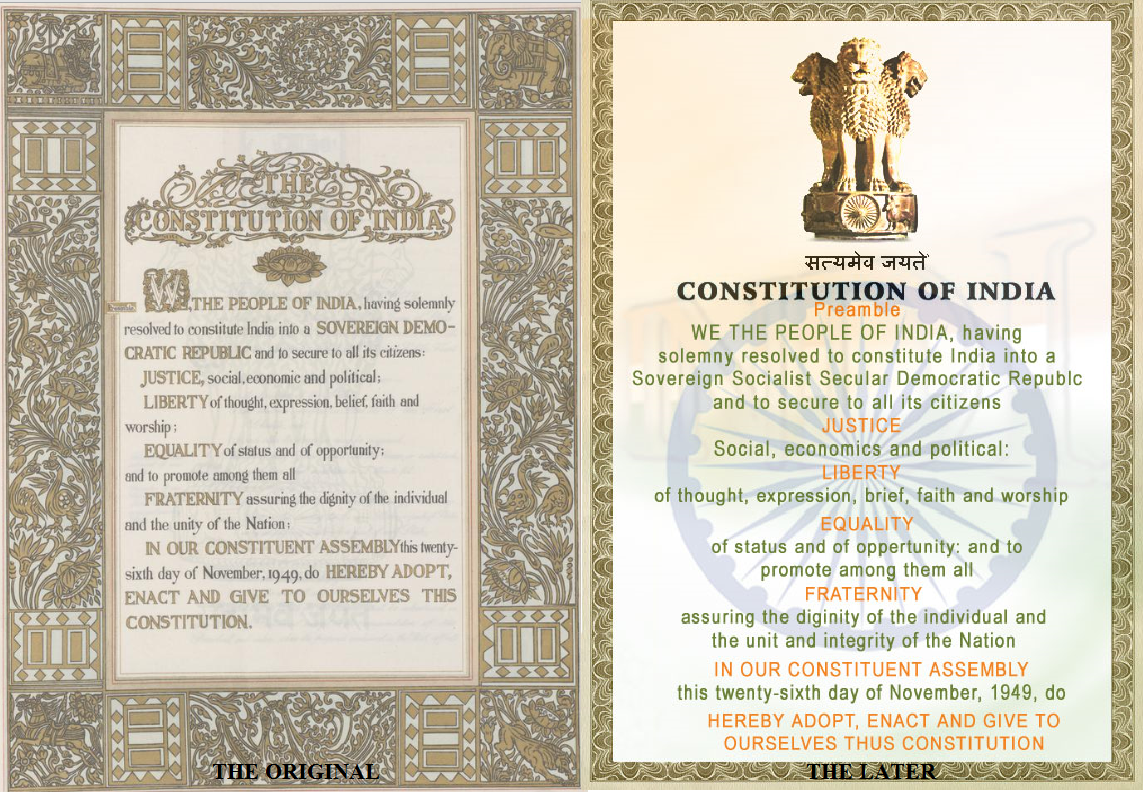- The use of the adjectives “socialist” and “secular” in the Indian Constitution’s Preamble has recently sparked criticism.
- The leader of a Lok Sabha party has expressed concern about these statements in the Preamble.

The Preamble’s Importance
- The Preamble outlines the fundamental ideas and goals of the Indian Constitution.
- It introduces the Constitution by articulating its core values.
- Content of the original preamble in 1950: When the Constitution went into effect in 1950, it did not include the words “socialist” or “secular.” It mirrored the Constituent Assembly’s vision and aspirations at the time.
“Socialist” and “Secular” have been included.
- The Fourth Amendment: During Prime Minister Indira Gandhi’s 1976 Emergency, the terms “socialist” and “secular” were introduced to the Preamble by The Constitution (42nd Amendment) Act.
- Indira Gandhi’s Programme: Indira Gandhi’s government sought to project a socialist and pro-poor image, echoing slogans like “garibi hatao” (eradicate poverty). The word “socialist” was added to emphasise socialism as a basic goal of the Indian state.
- Distinctive Indian Socialism: The Indian variant of socialism advocated selective nationalisation of critical sectors rather than total nationalisation.
Understanding the Term “Secular”
- Religious Diversity: India has a wide range of religious beliefs and practises. To promote harmony and brotherhood among people of different faiths, the adjective “secular” was inserted to the Preamble.
- State Neutrality: In the Indian context, secularism indicates that the state is neutral and unbiased towards all religions. It does not favour any one faith as the “state religion.”
- Secularism as Law: Articles 25-28 of the Indian Constitution guarantee the Indian state’s secular nature.
- The following are inherent in the Constitution: Even before the 42nd Amendment, the principle of secularism was incorporated in the Constitution.
Deliberations on the Terms “Socialist” and “Secular”
- Secularism Consensus: The concept of secularism was already incorporated into the ideology of the Constitution. The addition of the word “secular” to the Preamble simply made what was latent in numerous provisions clear.
- Discussions in the Constituent Assembly: The Constituent Assembly debated inserting these terms in the Preamble but decided against it.
- Dr. B. R. Ambedkar’s Point of View: Dr. B. R. Ambedkar believed that matters concerning the state’s policy, organisation, and economic aspects should be decided by the people rather than by the Constitution.
- Ongoing Debates: There have been petitions and discussions over the years to remove the words “socialist” and “secular” from the Preamble. Some say that these phrases were thrown in at random during the Emergency.
Conclusion
The use of the words “socialist” and “secular” in the Preamble has sparked debate and legal challenges, with varying perspectives on their inclusion and relevance in creating India’s constitutional identity.
Source: https://indianexpress.com/article/explained/socialist-secular-preamble-constitution-8948030/
